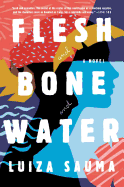
Luiza Sauma's first novel features an upper-class family using indulgence and dishonesty to deal with loss. Flesh and Bone and Water opens with a letter addressed to the narrator, André Cabral, a doctor in his late 40s living in London, separated from his wife and long estranged from his home country of Brazil. The novel then shifts to tell much of André's story through flashbacks, from his childhood in Rio de Janeiro through his now-failing marriage in "o primeiro mundo, the mythic first world" of Europe.
André was a member of Rio's privileged class, his family served by empregadas (maids) and guarded from "undesirables" in a fortress-like apartment building with spiked walls, CCTV and porteiros (caretakers). But unlike his friends, he wonders about the differences between his life and that of his family's empregadas, Rita and her daughter, Luana. Though he's dating an appropriately upper-class schoolmate, André becomes obsessed with his maid. And now, all these years later, middle-aged André is feeling adrift in a country not his own, when he gets a letter from Luana.
Flesh and Bone and Water is André's story. But it is also about race and class in 1980s Brazil, the struggles of a family torn by grief and the uprootedness of expatriates. Sauma's prose is lush with sensory detail, emphasizing the sights, sounds, smells and tastes of a Brazil that is far from André's daily reality, yet close to his heart: trickling sweat, comforting coconut milk, hot beach sand underfoot. Deeply atmospheric, Flesh and Bone and Water is an impressive debut. Strong characters, a twisting plot and compelling settings make this a pleasurable and memorable read. --Julia Jenkins, librarian and blogger at pagesofjulia

